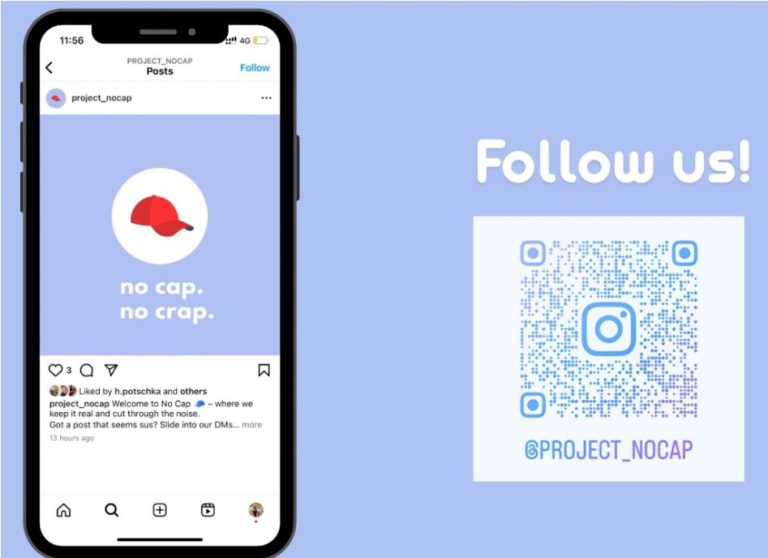- Spend five to ten hours per week on their Digital Entrepreneurship Certificate across the duration of the programme
- Work in teams of three to five students coming from different academic backgrounds
- Follow a design-thinking approach that will lead them towards innovative solutions with the support of Forward faculty
Certificates
Digital entrepreneurship
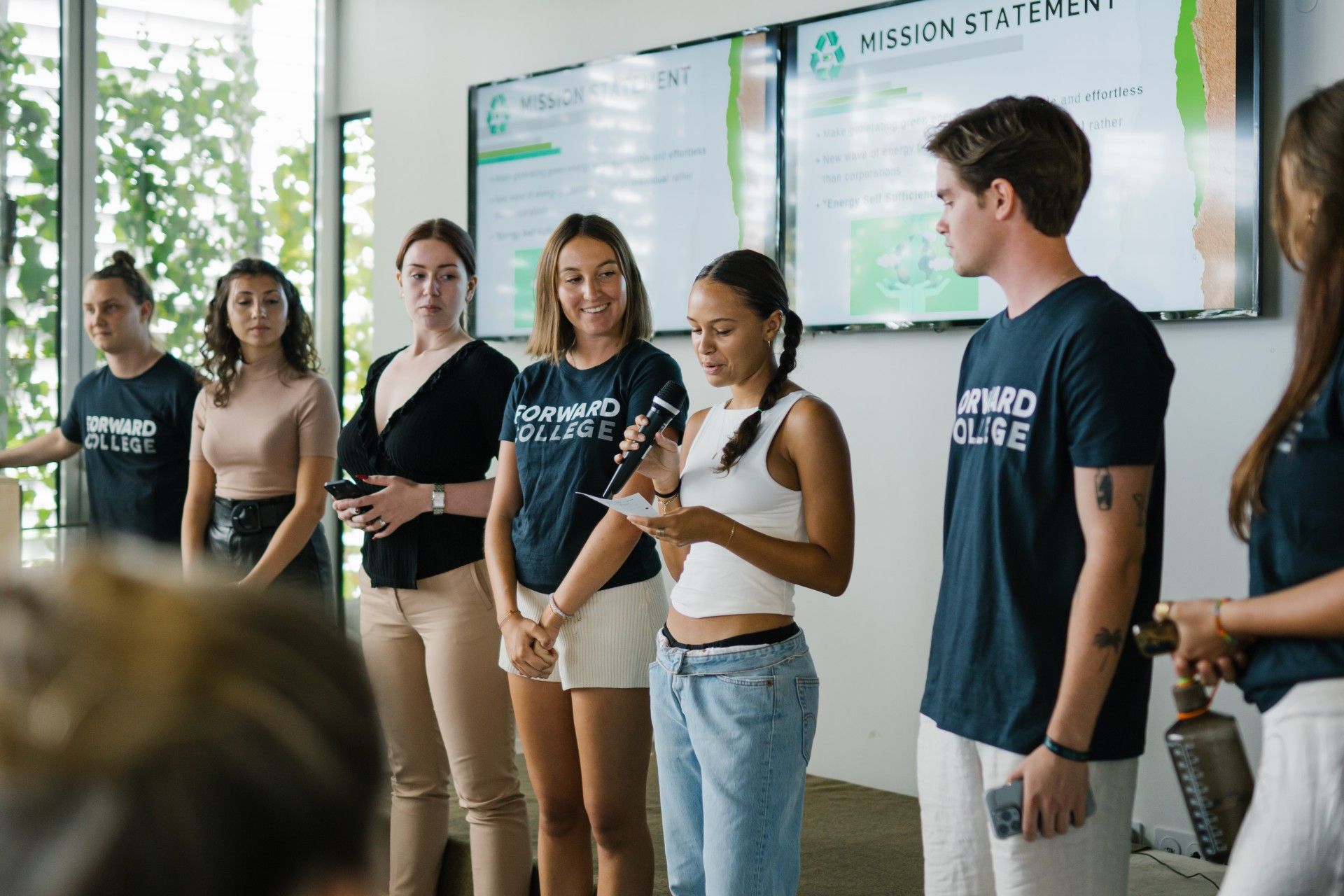
The Digital Entrepreneurship Certificate runs in parallel to the academic programme and is designed for students who wish to venture into creating a digital solution from scratch. The course aims at equiping students with the critical thinking and decision making tools to implement projects that positively impact the world around them, by solving an actual pain point for their users or ecosystems. This solution may be social – or business-oriented depending on your aspirations.
Expectations and
benefits
- The impact of their project based on a rigorous assessment and their engagement in the process
- Their journey: how they make sense of the different steps they went through, including the failed attempts that are part of the learning process
- Their skills development
- A concrete experience to share with future recruiters
- First hand understanding of no-code development, UX design or digital marketing
- Basic research skills
- A set of core entrepreneurial skills and mindset
Structure of the programme
Get up to speed: the Forward Bootcamp will introduce you to the core concepts, technologies, methodologies, and tools of digital solutions development.
Specialise: the Forward modular programme will allow you to specialise in one specific area such as coding, social networking, web development, or data. You will follow them across the certificate duration in parallel with your project development.
The design of the programme is based on five steps that echo the approach to real-world problem-solving of social issues:
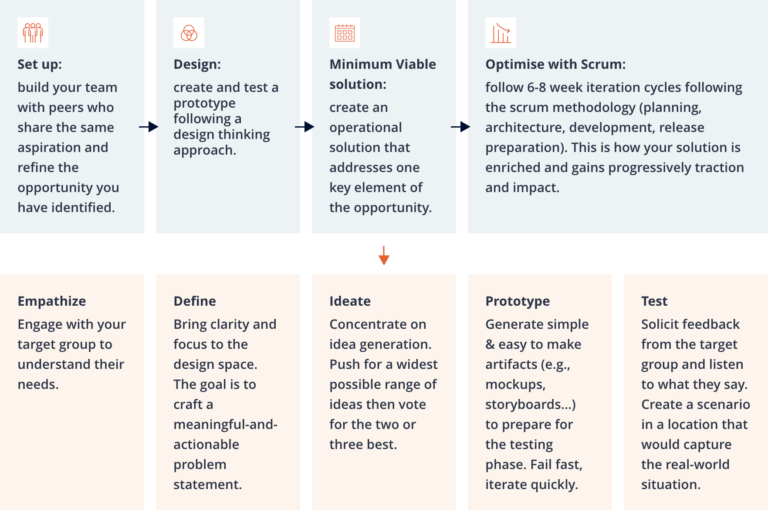
Start your project
- Team set-up: collaborate with two to three of your peers based on a shared idea, define your team rules, then refine the problem you wish to solve
- Envision & create: explore your driving values and intentions, and strengthen your creativity to solve real life challenges
- Strategise: define your target group, refine your value proposition, and analyse competition
- Design your MVP: define your basic functionalities and implement them in a prototype
- Optimise: launch the agile improvement cycle: evaluate gaps, enrich your functionalities, plan and prioritise, design, implement, review, and monitor to identify gaps
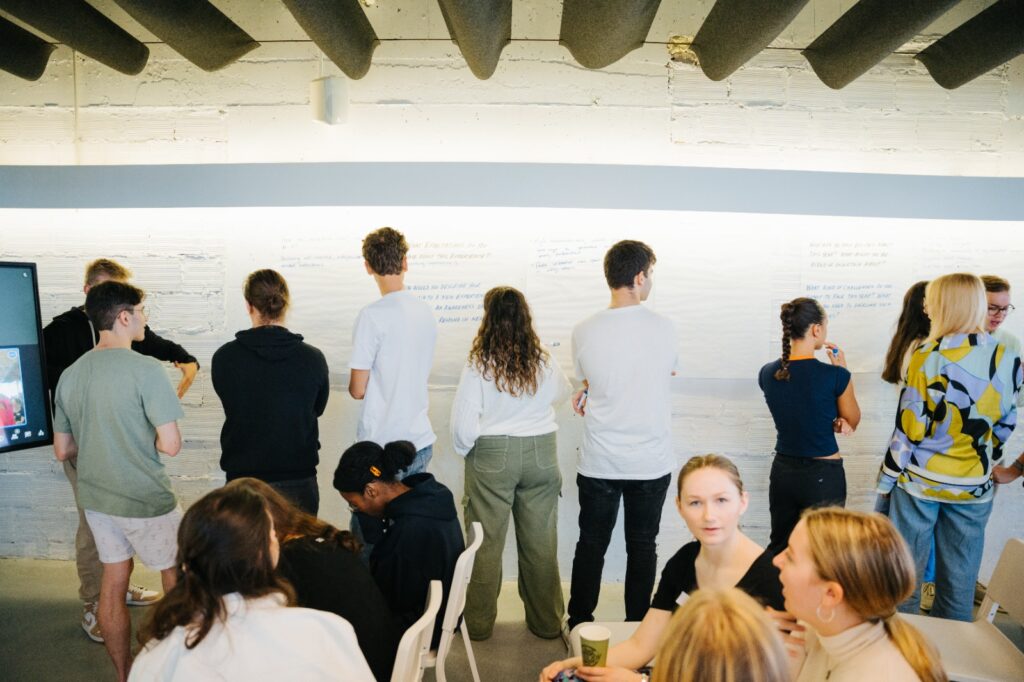
Teaching & learning activities
Throughout the year, students will:
Attend an introductory bootcamp to learn about the nature, applications, and implications of AI and machine learning, big data, internet of things, webmarketing, and cyber security. They will all practice the basics of coding and web development
Attend a specialisation learning session in the subset of digital skills of your choice:
- No-Code: Build an app using the no-code process development and become familiar with web development & coding
- Web development: Code in HTML5 and CSS3 Create interactive web experiences with JavaScript
- Digital design: basics of UX, graphic design, data visualisation, digital design techniques
- Social networking & content: understanding Social media algorithms, Core concepts and applications of digital marketing, multi channel approaches, data analysis for marketing
- Data: Data analysis process and tools, coding data analysis with Python

Creating a digital solution
Each step of this process is divided into assignments ranging from a one-week to eight-week duration. Each assignment (for example: “perform a benchmark of existing solutions”) follows the same sequence:
- Students are expected to explore the learning material communicated by the faculty corresponding to the assignment (what is a benchmark, how to perform a benchmark, how to present a benchmark)
- Students attend one (or a couple of) small group workshop(s) with their trainer to discuss how to implement the tools, methods, and concepts from the learning material for their own project
- Each team shares with its trainer a workplan to complete the assignment (milestones, task definition and organisation)
- Each team implements its plan while adjusting to circumstances with the support of the trainer
- The assignment is completed by a team debriefing session with the trainer to check advancement, bring corrective measures, and reflect on progress and challenges
Discover some of our students’ projects
No – Cap
Project No-Cap is a student-led digital initiative created by Giulia Rosa, Isaac Velez, Nicolette Setty, Oliver Solenský, and Hannah Potschka. It provides an AI-powered fact-checking tool designed specifically for social media content, helping users assess the credibility of Instagram posts and reels in response to the growing spread of misinformation online.
Objective: The main objective of Project No-Cap is to make fact-checking more accessible, fast, and easy for everyday social media users. By lowering the barrier to verification, the project aims to encourage more critical consumption of online content and reduce the unintentional spread of false or biased information.
Methodology: No-Cap operates through an Instagram-integrated AI system.
- Content submission:The user sends an Instagram post or reel directly to the @project_nocap Instagram account. Once received, the system extracts the caption, visual content, and audio (if applicable).
AI content analysis: Specialized AI agents analyze the content by identifying key claims, arguments, and context. A research-focused agent cross-references reliable sources, checks factual accuracy, and evaluates potential bias, while maintaining strict verification standards.
Content synthesis:The verified information is processed by a synthesis agent, which simplifies complex findings, ensures a neutral and unbiased presentation, and structures the results in a clear, accessible format.
- Result delivery: The user receives a response containing a detailed verification report, a short summary of findings, and links to relevant sources for further exploration and transparency.
ALIS: Spreading Awareness, Reducing Stigma
ALIS is an educational initiative led by Saskia Carr-Allinson, Hedda Karstad, and Hermine Skagestad, aimed at reducing the stigma surrounding eating disorders among German schoolchildren. The project’s name, derived from the Latin word for “wings,” symbolizes its mission to be a source of support and education for young minds, fostering understanding and empathy around mental health issues.
Objective: The project focuses on developing interactive workshops tailored for young students, designed to educate, dispel misconceptions, and promote mental health awareness. Through engaging activities and open discussions, Alis seeks to create a safe space where students can learn about eating disorders without judgment or bias.
Methodology: To ensure that the educational workshops are impactful and relevant, the team has adopted a mixed-methods approach:
- Qualitative Research: Interviews with mental health professionals, educators, and individuals with lived experience of eating disorders, to better understand the misconceptions and biases present among schoolchildren.
- Quantitative Surveys: Surveys administered to students to assess baseline knowledge and attitudes toward eating disorders, helping the team identify key areas for focus during workshops.
Development & Next steps:
The team is currently collaborating with ANAD, a German organization dedicated to providing support and information on eating disorders. As part of this initiative, the project is developing a website to complement their school workshops. The platform will offer students valuable resources before the sessions, allowing them to explore key information, and follow up with reflective questions afterward to deepen their understanding and engagement.
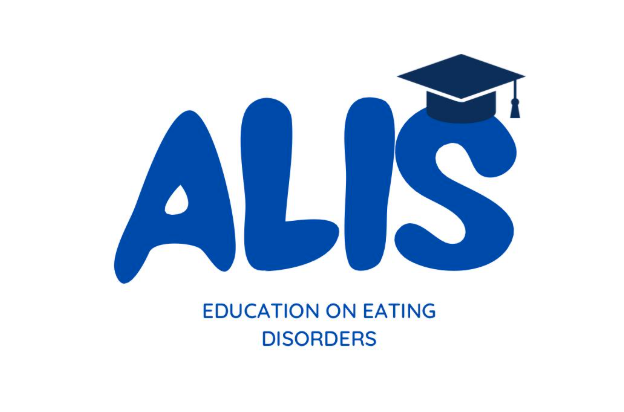
Mintensity – Reducing Carbon Emissions Through Smarter Energy Use
The carbon intensity of electricity fluctuates throughout the day as the energy mix shifts between renewable and fossil fuel sources. By adjusting the timing of electricity use—such as running laundry, dishwashers, or charging electric vehicles—households can significantly reduce their CO2 emissions.
Mintensity, a project developed by Forward students David, Sindre, Vanchhit, Samriddhi, and Friederich, provides real-time data on electricity sources, helping users make informed decisions to minimize their carbon footprint.
Objective: With climate change accelerating, reducing carbon emissions is a pressing challenge. Many people want to lower their energy-related CO2 footprint but lack access to real-time data on energy sources. Germany’s electricity mix varies throughout the day, yet most consumers remain unaware of the optimal times to use power-hungry appliances. Mintensity seeks to bridge this gap by making energy data accessible and actionable.
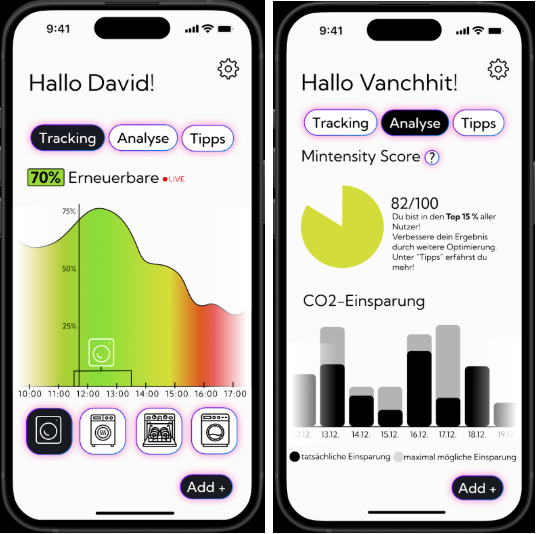
Methodology:
The team analyzed real-time energy generation data from the German power grid, focusing on the share of renewable vs. fossil-based electricity at any given moment. By leveraging data visualization and intuitive design, they developed a user-friendly platform that allows individuals to track carbon intensity and adjust their energy usage accordingly. The project follows an agile development approach, incorporating feedback from user testing to refine its features.
Development & Outcome:
Currently in development as part of the digital component of the Bachelor’s in Business & Leadership, Mintensity aims to empower individuals to take control of their energy-related CO2 emissions. The platform provides real-time updates on the electricity mix, enabling users to schedule their appliance usage for the lowest carbon impact. The project has already sparked engagement, with users participating in surveys and exploring its potential for daily decision-making.
Sip of Wine
SIP of Wine is a platform created by Luca Cervino, Simon Kristensen, Theo Croft, and Zsanett Frei to provide sustainable income for small, independent wine producers in France, particularly during the off-season.
The project connects wine enthusiasts with unique, high-quality wines while ensuring financial stability for local artisans. The platform fosters a stronger connection between producers and consumers while promoting sustainability in the wine industry.
Objective:
Independent wine producers, especially those in smaller regions of France, face financial challenges during the off-season when wine sales drop. Without a steady revenue stream, many of these artisans struggle to maintain their operations throughout the year. The team saw the opportunity to bridge the gap between producers and wine enthusiasts through a subscription-based model that would offer consistent support to local artisans while providing consumers with access to curated wine selections.
Methodology:
To design the platform, the team focused on understanding both the needs of winemakers and the desires of wine lovers. The approach included:
- Market Research: Analyzing trends in the wine industry and identifying gaps in the current market for independent producers.
- Interviews & Feedback: Engaging with wine producers to gather insights about their challenges and how they could benefit from a digital platform.
- User Experience (UX) Design: Creating a simple and intuitive platform for consumers, with a focus on showcasing the diversity of French wines and making the subscription process seamless.
Development & Outcome:
The platform was built around the subscription model, where members receive curated wine selections from different French wine regions. The app ensures a steady flow of revenue to producers while celebrating the craftsmanship behind each bottle.


